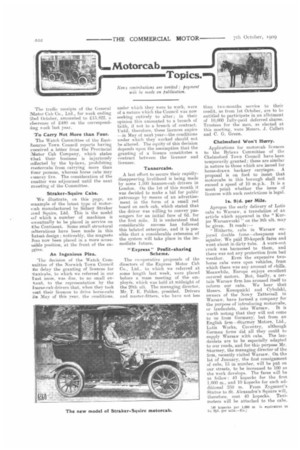Neu s contributions are invited : payment will be made on publication.
Page 14

If you've noticed an error in this article please click here to report it so we can fix it.
The traffic receipts of the General Motor Cab Co., Ltd., for week ending .t2nd October, amounted to jak5,822, decrease of .c.!480 on the corresponding week last year.
To Carry Not More than Four.
The Watch Committee of the Eastbourne Town Council reports having e-eceived a letter from the Provincial Motor Cab Company, which states that their business is injuriously :affected by the by-laws, prohibiting rnotorcabs from carrying more than four persons, whereas horse cabs may csonvey five. The consideration of the matter was adjourned until the next meeting of the Committee.
Straker-Squire Cabs.
We illustrate, on this page, an ,&..xample of the latest type of motorcab manufactured by Sidney Straker :and Squire, Ltd. This is the model saf which a number of machines is c:ventually to be placed in service on the Continent. Some small structural alterations have been made in this latest design ; noticeably, the magneto has now been placed in a more acees ele position, at the front of the engine.
An Ingenious Plea.
The decision of the Watch Committee of the Norwich Town Council to delay the granting of licences for -taxicabs, to which we referred in our last issue, wa.s due, to no small extent, to the representation by the horse-cab drivers that, when they took vont their licences to drive horse-cabs
May of this year, the conditions, under which they were to work, were of a nature which the Council was now seeking entirely to alter ; in their opinion this amounted to a breach of faith, if not to a breach of contract. Until, therefore, these licences expire —in May of next year—the conditions under which they worked should not be altered. The equity of this decision depends upon the assumption that the granting of a licence constitutes a contract between the licensor and licensee.
Tannercabs.
A last effort to secure their rapidlydisappearing livelihood is being made by some 1,500 hansom-cab drivers in London. On the 1st of this month it was decided to make a bid for public patronage by means of an advertisement in the form of a small red board on each cab, which stated that the driver was willing to convey passengers for an initial fare of 6d. for the first mile. It is understood that considerable success has followed this belated enterprise, and it is possible that a considerable extension of the system will take place in the immediate future.
"Express" Profit-sharing Scheme.
The co-operative proposals of the directors of the Express Motor Cab Co., Ltd., to which we referred at some length last week, were placed before a mass meeting of the employes, which was held at midnight of the 29th ult. The managing director, Mr. T. E. Polden, presided. Drivers and master-fitters, who have not less
than two-months service to their credit, as from 1st October, are to be entitled to participate in. an allotment of 10,000 fully-paid deferred shares. Trustees for the men, as elected at this meeting, were Messrs. J. Collett and C. G. Green.
Chelmsford Won't Hurry.
Applications for motorcab licences to the Bylaws Committee of the Chelmsford Town Council have been temporarily granted: these are similar in nature to those which are issued for horse-drawn hackney carriages. A proposal is on foot to insist that motoreabs in this borough shall not exceed a speed of 10 m.p.h. It is a moot point whether the issue of licences with such restrictions is legal.
is. 91d. per Mile.
Apropos the early delivery of Lotis cabs to Warsaw, a translation of an article which appeared in the " Kurjer Warszawszki " on the 9th ult. may be given. It reads:—
" Hitherto, cabs in Warsaw enjoyed double fame—cheapness and squalor. We paid 20-kopeck fares and went about in dirty tubs. A worn-out crock was harnessed to them, and there was not any protection from bad weather. Even the expensive twohorse cabs were open vehicles, from which there was any amount of chills. Meanwhile, Europe enjoys excellent covered motors. But, finally, a certain Warsaw firm has aroused itself to reform our cabs. We hear that iklessrs. Konopnicki and Cybulski, owners of the Nowy Tattersall in Warsaw, have formed a company for the purpose of introducing motorca.bs,
or landanlets, into Warsaw. It is worth noting that they will not come to us from Germany, but from an English firm —Sturmey Motors, Ltd., Lotis Works, Coventry, although German firms did all they could to supply Warsaw with cabs. The Iandaulets are to be especially adapted to our roads, and for this purpose Mr. Sturmey, the managing director of the firm, recently visited Warsaw. On the 1st of January, the first consignment of cabs, 15 in number, will be put on our streets, to be increased to 100 as the work develops. The fares will be as follow : 40 kopecks for the first 1,000 in., and 10 kopecks for each additional 250 m. From Zygmunt's Statue to St. Alexandra's Square will, therefore, cost 40 kopecks. Taximeters will be attached to the cabs_ rio kopecks per 1,000 ra is equivalent to 1 a, Ofd. per mile.—.Eo.]






















